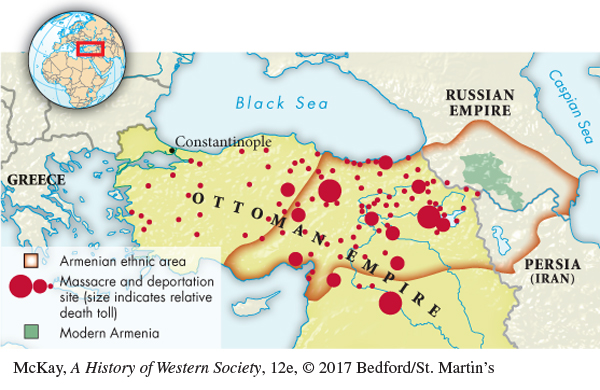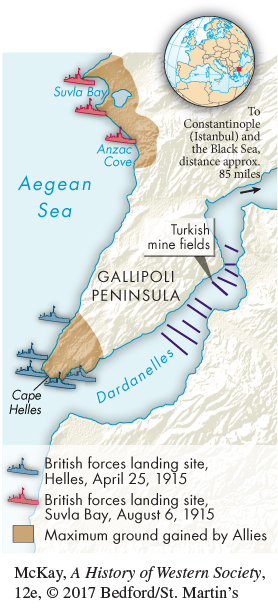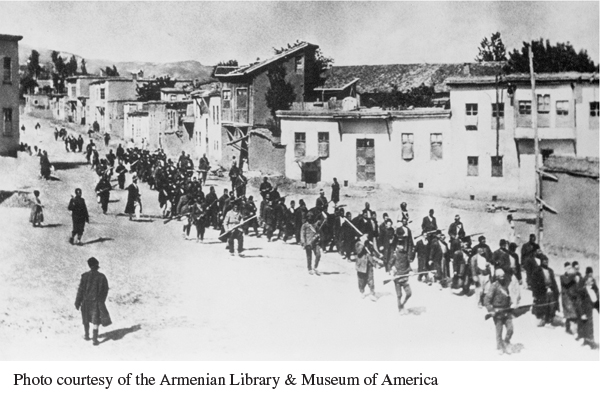A History of Western Society: Printed Page 839
A History of Western Society, Value Edition: Printed Page 806
A History of Western Society, Concise Edition: Printed Page 837
The Widening War
On the eastern front, the slaughter did not immediately degenerate into trench warfare, and the fighting was dominated by Germany. Repulsing the initial Russian attacks, the Germans won major victories at the Battles of Tannenberg and the Masurian Lakes in August and September 1914. Russia put real pressure on the relatively weak Austro-
To govern these occupied territories, the Germans installed a vast military bureaucracy, with some 15,000 army administrators and professional specialists. Anti-
The changing tides of victory and hopes for territorial gains brought neutral countries into the war (see Map 25.3). Italy, a member of the Triple Alliance since 1882, had declared its neutrality in 1914 on the grounds that Austria had launched a war of aggression. Then in May 1915 Italy switched sides to join the Triple Entente in return for promises of Austrian territory. The war along the Italian-
In October 1914 the Ottoman Empire joined Austria and Germany, by then known as the Central Powers. The following September Bulgaria followed the Ottoman Empire’s lead in order to settle old scores with Serbia. The Balkans, with the exception of Greece, were occupied by the Central Powers.

The entry of the Ottomans carried the war into the Middle East. Heavy fighting between the Ottomans and the Russians in the Caucasus enveloped the Armenians, who lived on both sides of the border and had experienced brutal repression by the Ottomans in 1909. When in 1915 some Armenians welcomed Russian armies as liberators, the Ottoman government, with German support, ordered a mass deportation of its Armenian citizens from their homeland. In this early example of modern ethnic cleansing, often labeled genocide, about 1 million Armenians died from murder, starvation, and disease.
In 1915, at the Battle of Gallipoli, British forces tried and failed to take the Dardanelles and Constantinople from the Ottoman Turks. The invasion force was pinned down on the beaches, and the ten-

The British were more successful at inciting the Arabs to revolt against their Ottoman rulers. They bargained with the foremost Arab leader, Hussein ibn-
The British enjoyed similar victories in the Ottoman province of Mesopotamia (today’s Iraq). British troops quickly occupied the southern Iraqi city of Basra in 1914, securing their access to the region’s oil fields. After a series of setbacks at the hands of Ottoman troops, the British captured Baghdad in 1917. In September 1918 British armies and their Arab allies rolled into Syria, a large and diverse Ottoman territory that included the holy lands of Palestine and the present-

The war spread to East Asia and colonial Africa as well. Japan declared war on Germany in 1914, seized Germany’s Pacific and East Asian colonies, and used the opportunity to expand its influence in China. In Africa, instead of rebelling as the Germans hoped, colonial subjects of the British and French generally supported the Allied powers and helped local British and French commanders take over German colonies.
The European world war spilled out of European borders and brought non-
After three years of refusing to play a fighting role, the United States was finally drawn into the expanding conflict. American intervention grew out of the war at sea and general sympathy for the Triple Entente. At the beginning of the war, Britain and France established a naval blockade to strangle the Central Powers. No neutral cargo ship was permitted to sail to Germany. In early 1915 Germany retaliated with attacks on supply ships from a murderously effective new weapon, the submarine.
In May 1915 a German submarine sank the British passenger liner Lusitania, claiming more than 1,000 lives, among them 139 U.S. citizens. President Woodrow Wilson protested vigorously, using the tragedy to incite American public opinion against the Germans. To avoid almost-
Early in 1917 the German military command — hoping that improved submarines could starve Britain into submission before the United States could come to its rescue — resumed unrestricted submarine warfare. This was a reckless gamble, and the United States declared war on Germany in April of that year. Eventually the United States tipped the balance in favor of the British, French, and their allies.